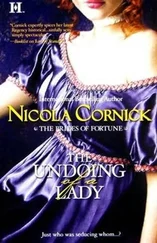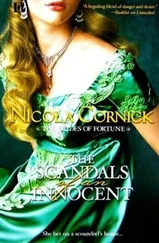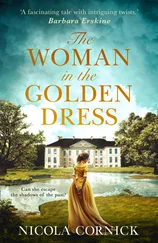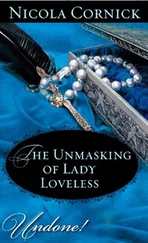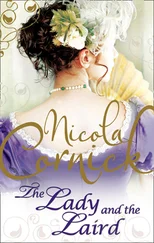“For all your expression and tone of voice,” Blanche said, “I do believe, my lord, you have an affection for those little boys. You do not deceive me.”
“Dear me,” Julian said faintly as the sitting room door opened again.
THERE WAS a spinet in one corner of the sitting room. Verity had eyed it a few times during the day with some longing, but its lid was locked, she had discovered. While the Reverend Moffatt was setting up the room after dinner for the Christmas service, his wife asked about the instrument. Mr. Hollander looked at it in some surprise, as if he were noticing it for the first time. He had no idea where the key was. It hardly mattered anyway unless someone was able to play it.
There was a short silence.
“I can play,” Verity said.
“Splendid!” The Reverend Moffatt beamed at her. “Then we may have music with the service, Lady Folingsby. I would lead the singing if I had to, but I have a lamentably poor ear for pitch, do I not, Edie? We would be likely to end a hymn several tones lower than we started it.” He laughed heartily.
Mr. Hollander went in search of the key. Or rather, he went in search of a servant who might know where it was.
“Where did you learn to play, Blanche?” Debbie asked.
“At the rectory.” Verity smiled and then wished she could bite out her tongue. “The rector’s wife taught me,” she added hastily. That was the truth, at least.
Mr. Hollander came back in triumph, a key held aloft. The spinet was sadly out of tune, Verity discovered, but not impossibly so. There was no music, but she did not need any. All her favorite hymns, as well as some other favorite pieces, had been committed to memory when she was still a girl.
A table had been converted into an altar with the aid of a crisp white cloth one of the maids had ironed carefully, candles in silver holders and a fancy cup and plate the housekeeper had found somewhere in the nether regions of the house and the other maid had polished to serve as a paten and chalice. The butler had dusted off a bottle of Mr. Hollander’s best wine. The cook had found time and space in her oven to bake a round loaf of unleavened bread. The Reverend Moffatt had clad himself in vestments he had brought with him and suddenly looked very young and dignified and holy.
The sitting room, Verity thought, gazing about her, had become a holy place, a church. Everyone, even the children, sat hushed as they would in a church, waiting for the service to begin. Verity did not wait. She began to play quietly some of her favorite Christmas hymns.
It was Christmas, she thought, swallowing and blinking her eyes. She had not thought it would come for her this year except in the form of an ugly selfsacrifice. But for all the lies and deceptions—with every glance down at her hands she saw the false wedding ring—Christmas had come. Christmas, she reminded herself, and the reminder had never been more apt, was for sinners, and they were all sinners: Mr. Hollander, Debbie, Viscount Folingsby and her. But Christmas had found them out, despite themselves, in the form of the clergyman and his family, stranded by a snowstorm. And Christmas was offering all its boundless love and forgiveness to them in the form of the bread and the wine, which were still at this moment just those two commodities.
A child had been born on this night more than eighteen hundred years ago, and he was about to be born again as he had been each year since then and would be each year in the future. Constant birth. Constant hope. Constant love.
“My dear friends.” The clergyman’s voice was quiet, serene, imposing, unlike the voice of the Reverend Moffatt who had conversed with them over tea and dinner. He smiled about at each one of them in turn, bathing them—or so it seemed—in the warmth and peace and wonder of the season.
And so the service began.
It ended more than an hour later with the joyful singing of one last hymn. They all sang lustily, Verity noticed, herself included. Even one of the coachmen, who was noticeably tone-deaf, and the housekeeper, who sang with pronounced vibrato. Mr. Hollander had a strong tenor voice. Debbie sang with a Yorkshire accent. David Moffatt sang his heart out to a tune of his own devising. They would not have made a reputable choir. But it did not matter. They made a joyful noise. They were celebrating Christmas.
And then Mrs. Moffatt spoke up, a mere few seconds after her husband had said the final words of the service and wished them all the compliments of the season.
“I do apologize, Mr. and Mrs. Hollander,” she said, “for all the inconvenience I am about to cause you. Henry, my dear, I do believe we are going to have a Christmas child.”
HENRY MOFFATT was pacing as he had been doing almost constantly for the past several hours.
“One would expect to become accustomed to it,” he said, pausing for only a moment to stare, pale faced and anxious eyed, at Julian and Bertie, who were sitting at either side of the hearth, hardly any less pale themselves, “after two previous confinements. But one does not. One thinks of a new child—one’s own—making the perilous passage into this world. And one thinks of one’s mate, flesh of one’s own flesh, heart of one’s heart, enduring the pain, facing all the danger alone. One feels helpless and humble and dreadfully responsible. And guilty that one does not have more trust in the plans of the Almighty. It seems trivial to recall that we have hoped for a daughter this time.”
He resumed his journey to nowhere, back and forth from one corner of the room to the other. “Will it never end?”
Julian had never before shared a house with a woman in labor. When he thought about it, about what was going on abovestairs—and how could he not think about it?—he felt a buzzing in his ears and a coldness in his nostrils and imagined in some horror the ignominy of fainting when he was not even the prospective father. He remembered how glibly just a few days before he had planned to have a child of his own in the nursery by next Christmas or very soon after.
It must hurt like hell, he thought, and that was probably the understatement of the decade.
There was no doctor in the village. There was a midwife, but she lived, according to the housekeeper, a mile or so on the other side of the village. It would have been impossible to reach her, not to mention persuading her to make the return journey, in time to deliver the child who was definitely on its way.
Fortunately, Mrs. Moffatt had announced with a calm smile—surely it had been merely a brave facade—she had already given birth to two children, as well as attending the births of a few others. She could manage very well alone, provided the housekeeper would prepare a few items for her. It was getting late. She invited everyone else to retire to bed and promised not to disturb them with any loud noises.
Julian had immediately formed mental images of someone screaming in agony.
Debbie had looked at Bertie with eyes almost as big as her face.
“If you are quite sure, ma’am,” Bertie had said, as white as his shirt points.
“Come, Henry,” Mrs. Moffatt had said, “we will put the children to bed first. Perhaps I can see you in here for a few minutes afterward, Mrs. Simpkins.”
Mrs. Simpkins had been looking a delicate shade of green.
That was when Blanche had spoken up.
“You certainly will not manage alone,” she had assured the guest. “It will be quite enough for you to endure the pain of labor. You will leave the rest to us, Mrs. Moffatt. Sir,” she said, addressing the clergyman, “perhaps you can put the children to bed yourself tonight? Boys, give your mama a kiss. Doubtless there will be more than one wonderful surprise awaiting you in the morning. The sooner you fall asleep, the sooner you will find out what. Mrs. Lyons, will you see that a large pot of water is heated and kept ready? Mrs. Simpkins, will you gather together as many clean cloths as you can find? Debbie—”
Читать дальше

